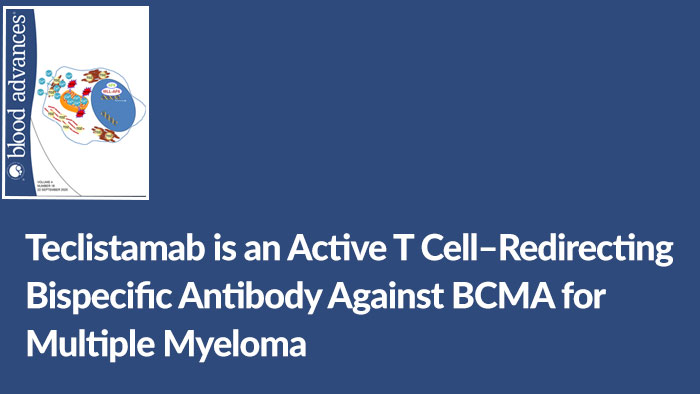The success of T cell–mediated therapeutics depends, in part, on the selective expression of cell surface target epitopes to minimize the off-tissue toxicity. B-Cell Maturation Antigen (BCMA) is a protein that is selectively expressed on late-stage B cells and plasma cells, and its expression levels correlate with myeloma tumor burden. In multiple myeloma (MM), BCMA promotes the proliferation and survival of MM cells and is associated with the immunosuppression which is the hallmark of MM.
In this pre-clinical study, teclistamab induced cytotoxicity of BCMA+ MM cell lines in vitro.1
Key Points
- Teclistamab is a BCMAxCD3 bispecific antibody that can induce T cell–mediated killing of BCMA+ cells.
- Teclistamab is currently in a phase 1 clinical trial in patients with relapsed/refractory MM.
The authors conluded “The specific and potent activity of teclistamab against BCMA-expressing cells from MM cell lines, patient samples, and MM xenograft models warrant further evaluation of this bispecific antibody for the treatment of MM.”1
Phase 1 clinical trials (monotherapy, #NCT03145181; combination therapy, #NCT04108195) are ongoing for patients with relapsed/refractory MM.
Results from the Phase 1 study were presented at the ASCO 2020 vitual meeting. The study is being conducted in two parts: dose escalation (part 1) and dose expansion (part 2). Results from the Phase 1 part of the study showed deep responses among patients (n=78) who were treated with teclistamab across dose groups, ranging from 0.3 µg/kg-720 µg/kg. At the 270 µg/kg dose (n=12), the overall response rate (ORR) was 67 percent (8/12); 50 percent (6/12) of patients achieved a very good partial response (VGPR) or better, and three patients achieved CR. Responses were deep and persisted. At the time of data cut-off, 76 percent (16/21) of patients who achieved a response across all doses remained in the study with an ongoing response, and 80 percent (4/5) who were evaluable for MRD analysis were MRD-negative, with two patients having a MRD-negative CR. Maintained MRD-negativity was confirmed for both patients who could be evaluated.1 Additional dose escalation and expansion of the study is ongoing.
Investigators reported that patients achieved deep responses which persisted, including some minimal residual disease (MRD)-negative complete responses (CR) at 10-6, with one durable beyond 12 months.
In the Phase 1 study, the most common adverse events (AEs) (all grade) were anaemia (58 percent); cytokine release syndrome (CRS) (56 percent); neutropenia (45 percent); thrombocytopenia (40 percent); and pyrexia (31 percent). In patients who experienced Grade 3 and above AEs (≥20 percent), the most common were neutropenia (38 percent); anaemia (36 percent); and thrombocytopenia (24 percent).1 One Grade 5 AE, respiratory failure in the setting of pneumonia, was reported but deemed by the investigator to be unrelated to the treatment.1 CRS events were all mild or moderate (Grade 1–2) and generally confined to first step-up and full doses, which may support the use of step-up dosing to mitigate CRS.1
References:
Pillarisetti K, Powers G, Luistro L, et al. Teclistamab is an active T cell–redirecting bispecific antibody against B-cell maturation antigen for multiple myeloma Blood Adv (2020) 4 (18): 4538–4549.
Usmani S, Mateos MV, Nahi H, et al. Phase I study of teclistamab, a humanized B-cell maturation antigen (BCMA) x CD3 bispecific antibody, in relapsed/refractory multiple myeloma (R/R MM). J Clin Oncol 38: 2020 (suppl; abstr 100) DOI: 10.1200/JCO.2020.38.15_suppl.100
